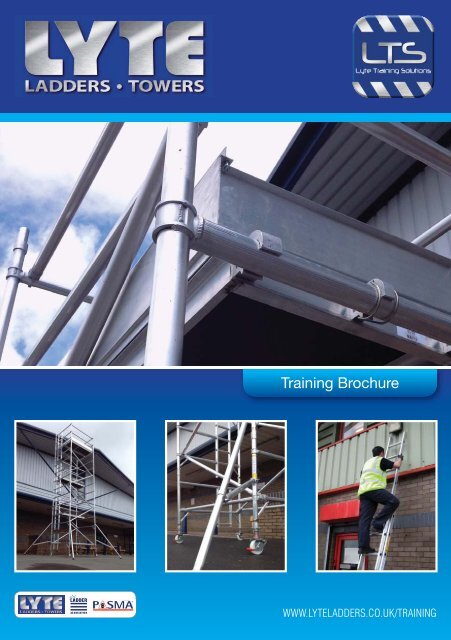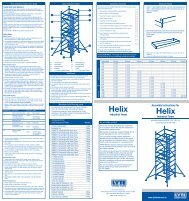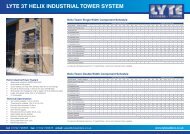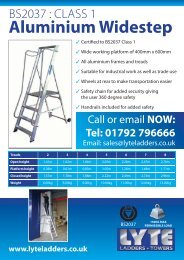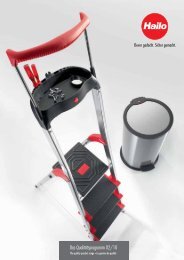Training Brochure - Lyte Ladders & Towers
Training Brochure - Lyte Ladders & Towers
Training Brochure - Lyte Ladders & Towers
Create successful ePaper yourself
Turn your PDF publications into a flip-book with our unique Google optimized e-Paper software.
<strong>Training</strong> <strong>Brochure</strong><br />
WWW.LYTELADDERS.CO.UK/TRAINING
CONTENTS<br />
03_<strong>Lyte</strong> <strong>Ladders</strong> & <strong>Towers</strong> History<br />
04_Pasma Introduction<br />
05_Pasma <strong>Towers</strong> for Users<br />
06_Pasma <strong>Training</strong> Day Schedule<br />
07_Pasma - Other Courses Available<br />
08_TLA Introduction<br />
09 _TLA Ladder & Stepladder <strong>Training</strong><br />
10_TLA <strong>Training</strong> Day Schedule<br />
11_TLA Inspection & Non-user Inspection Course<br />
COURSES AVAILABLE<br />
PASMA TOWERS FOR USERS COURSE:<br />
1 day course<br />
PASMA LOW LEVEL ACCESS COURSE:<br />
½ day course<br />
PASMA TOWERS FOR MANAGERS COURSE:<br />
1 day course<br />
PASMA WORK AT HEIGHT (ESSENTIALS) COURSE:<br />
½ day course<br />
THE LADDER ASSOCIATION LADDER<br />
& STEPLADDER TRAINING COURSE:<br />
1 day<br />
THE LADDER ASSOCIATION<br />
INSPECTION COURSE:<br />
½ day course<br />
THE LADDERS ASSOCIATION<br />
NON-USER INSPECTION COURSE:<br />
1 day course<br />
2<br />
www.lyteladders.co.uk/training
HISTORY...<br />
<strong>Lyte</strong> <strong>Ladders</strong> & <strong>Towers</strong> are one of the leading manufacturers of aluminium and<br />
glass-fi bre ladders, stepladders and towers in the UK. Established in South Wales<br />
in 1947, the comprehensive portfolio of access equipment is renowned for its<br />
quality of design and manufacture.<br />
3 Products are manufactured at <strong>Lyte</strong> Industries new premises in Swansea Enterprise Park.<br />
3 Probably the largest portfolio of Trade and Industrial products in the UK which now includes the<br />
comprehensive range of Hailo products.<br />
3 All products certifi ed to the relevant standards, where applicable.<br />
These include BS2037 Class 3, BSEN131, BS2037 Class 1 and BSEN1004:2004.<br />
3 <strong>Lyte</strong> products are supplied to leading organisations throughout the UK including BT, Sky, HSS<br />
Hire and Screwfi x.<br />
3 Highly trained and friendly in-house telesales and area representatives.<br />
3 106,000sq ft of production, warehousing and distribution.<br />
3 <strong>Lyte</strong> has manufactured a number of specialist products to meet even the most challenging of<br />
tasks. These products include fi re ladders for brigades and fi re & rescue services in the UK and<br />
abroad as well as many types of bespoke access products.<br />
3 <strong>Lyte</strong> has achieved ISO9001:2008 and OHSAS 18001.<br />
The <strong>Lyte</strong> training department was developed in<br />
2005 as a result of the introduction of the Work at<br />
Height Act and the courses created by The Ladder<br />
Association and PASMA.<br />
As members of PASMA and The Ladder Association<br />
we carry an accreditation from each of these as an<br />
offi cial training centre. We are based in Swansea,<br />
South Wales, where courses can be carried out at our<br />
fully equipped training centre. However all courses<br />
can be delivered anywhere in the UK by our highly<br />
skilled instructors. Under the regulations every<br />
person in the chain leading up to, and including,<br />
the fi nal user, has a duty of care to both themselves<br />
and others to know and understand the practical<br />
implications of working safely at height.<br />
Tel: 01792 765968<br />
PASMA training is the most widely recognised form<br />
of Prefabricated Mobile Access Tower <strong>Training</strong> in<br />
the UK and provides successful delegates with a<br />
competency certificate and an encapsulated photo-<br />
ID card verifying that they have passed the written<br />
and practical tests to PASMA’s strictly enforced<br />
standards.<br />
The Ladder Association courses requires a<br />
demonstration of competence as a key requirement<br />
of the new regulations and successful completion of<br />
Ladder Association training courses, delivered only<br />
by Ladder Association approved training centres,<br />
provides proof of such competence.<br />
After the successful completion of a practical and<br />
written test the candidate will received a certificate<br />
and photo ID card.<br />
3
PASMA PROFESSIONAL TRAINING<br />
The Work at Height Regulations 2005, require that the assembly,<br />
dismantling or alteration of Mobile Access <strong>Towers</strong> should only be<br />
undertaken by a competent person, or if being trained, under the<br />
supervision of a competent person.<br />
A competent person is a person who can demonstrate that they have sufficient professional<br />
or technical training, knowledge, actual experience, and authority* to enable them to:<br />
A. Carry out their assigned duties at the level of responsibility allocated to them;<br />
B. Understand any potential hazards related to the work (or equipment) under consideration;<br />
C. Detect any technical defects or omissions in that work (or equipment), recognise any implications for health and safety<br />
caused by those defects or omissions, and be able to specify a remedial action to mitigate those implications.<br />
Note:<br />
‘Authority’ here means delegated authority to the individual by his employer to carry out a certain function or duty. Going<br />
onto or assembling a mobile access tower will involve working at height. The Advisory Committee on Work at Height<br />
<strong>Training</strong> (ACWAHT) indicate that for anyone who works at height, the above defi nition of a competent person implies:<br />
• To know and understand the specifi c legal duties under the Work at Height Regulations which apply to them<br />
as an individual.<br />
• To understand who controls their activity and the lines of communication to use.<br />
• To understand the principles of fall protection that the Regulations require to be used.<br />
• To be able to recognise safe and unsafe situations / activities.<br />
• To understand how to deal with the hazards associated with the task allocated to them.<br />
• To have adequate training in the correct use and limitations of any work equipment allocated to them for the task.<br />
• To understand the need for and the ability to check the adequacy of the safety equipment allocated to them.<br />
• If that equipment has been issued to them on a personal basis, an understanding of the correct procedure for storage,<br />
maintenance and inspection.<br />
• To understand safe procedures of work and state the correct procedure for the task, the emergency (including rescue)<br />
procedures in place for the work and their role in it.<br />
• To know the procedure for reporting any defects, hazards or unsafe procedures they detect.<br />
PASMA therefore sponsors training courses<br />
provided only by authorised training members.<br />
The training courses are based on a format<br />
and content agreed by all PASMA members<br />
and draws upon their collective, first-hand<br />
experience.<br />
Widely recognised and recommended by safety<br />
professionals, it provides successful delegates<br />
who pass a written and practical test with a<br />
competency certificate and an encapsulated,<br />
credit card sized PhotoCard.<br />
4 www.lyteladders.co.uk/training
PASMA TOWERS FOR USERS<br />
Aims:<br />
The aim of the course is to inform and instruct nominated persons<br />
regarding the statutory requirements under the Work at Height<br />
Regulations 2005 in the safe installation and removal, inspection and<br />
use of mobile access towers.<br />
• Introduction - Why the need for training?<br />
• Work at Height Regulations 2005.<br />
• Ground conditions.<br />
• Use of base plates and sole boards.<br />
• Bracing and boarding.<br />
• Working platforms.<br />
• 3T Build Method.<br />
• Record of scaffold inspection.<br />
• Assessment sheet.<br />
• Practical section (if off site an area with 6m<br />
head clearance is required).<br />
• Maximum 12 delegates per course.<br />
• Guard-rails and toeboards.<br />
• Couplers and ties.<br />
• Ladder access.<br />
Course Duration:<br />
This is a one day course. Pasma training will usually start at 9am and finish at around 4pm.<br />
Tel: 01792 765968<br />
5
TRAINING DAY SCHEDULE<br />
9.00am<br />
10.15am<br />
10.30am<br />
12.30pm<br />
1.00pm<br />
Approx 4.00pm<br />
Introduction<br />
Health and Safety<br />
Accident Awareness/Prevention<br />
Tower standards and Tower types<br />
Tower Components<br />
PASMA assembly Procedures.<br />
A) Assembling a Tower<br />
B) Moving a Tower<br />
C) Dismantling a Tower<br />
Mid-morning Break<br />
Safe Use of Mobile Access <strong>Towers</strong><br />
A. When assembling a Tower<br />
B. During use of a Tower<br />
C. When moving a Tower<br />
D. When dismantling a Tower<br />
Stability<br />
Hazards<br />
Inspection and the PASMA inspection tag<br />
PASMA Written Test<br />
Lunch (provided when course held at <strong>Lyte</strong> ladders)<br />
Pasma Practical Session<br />
Pasma Practical Test<br />
Final paperwork/course assessment/fi nish<br />
Aims:<br />
The aim of the PASMA training course is to ensure personnel<br />
are trained to a high level of competence to carry out<br />
inspections, create safe systems of work and to understand<br />
employees’ responsibilities.<br />
6 www.lyteladders.co.uk/training
PASMA - OTHER COURSES<br />
LOW LEVEL ACCESS<br />
Who will benefi t from this course:<br />
Personnel who work from prefabricated units under 2.5m of height<br />
Learning Objectives:<br />
How to safely assemble, dismantle and relocate low level access<br />
units without risk of personal injury to the delegate or others.<br />
Method:<br />
Instruction both in theory and practical sessions.<br />
Assessment:<br />
Closed book course with a pass mark of 80% in both the theory and Practical.<br />
Course Content:<br />
Current Legislation, Regulations and Guidance affecting work at height with low level access units,<br />
PASMA Code of Practice, Publicly Available Specifi cation, assembling, altering and dismantling<br />
low level units incorporating current best practice for fall protection, inspection of completed<br />
low level units and completion of Tower Inspection Records; hazards affecting the use of low level units.<br />
MANAGEMENT OF MOBILE ACCESS TOWERS<br />
Who will benefi t from this course:<br />
Any person who has responsibility for overseeing the work of operatives on site ensuring that<br />
work is properly planned and organised and that those involved in carrying out the work are<br />
competent and properly trained, and that towers are correctly inspected and maintained.<br />
Learning Objectives:<br />
To learn about current legislation, regulations and guidance<br />
affecting work at height using mobile access towers.<br />
Method:<br />
Theory session with exercises<br />
Assessment:<br />
Open book assessment with an 80% pass mark<br />
Course Content:<br />
Current Legislation, Regulations and Guidance affecting work at<br />
height with mobile access towers, PASMA Code of Practice,<br />
a look at assembling, altering and dismantling mobile access towers<br />
incorporating current best practice for fall protection, inspection<br />
of completed mobile access towers and completion of Tower Inspection<br />
Records; hazards affecting the use of mobile access towers.<br />
Supporting Documents:<br />
A course content and notes booklet and a current Code of Practice<br />
booklet will be issued to all delegates who attend the course.<br />
Tel: 01792 765968<br />
7
THE LADDER ASSOCIATION...<br />
...progressing safety<br />
and best practice<br />
step by step<br />
As a natural and logical extension of its activities, the Ladder Association, formerly the<br />
British Ladder Manufacturers Association (BLMA), now operates a national training<br />
scheme for users, supervisors and managers wanting to equip themselves with the<br />
knowledge, skills and confidence necessary to use ladders legally and safely.<br />
Written with guidance from the UK’s leading experts on ladder manufacture, maintenance<br />
and safety, the Ladder Association scheme addresses all the issues raised by the Health &<br />
Safety at Work Act 1974 and, more recently, the Work at Height Regulations 2005.<br />
Under the regulations every person in the chain leading<br />
up to, and including, the final user, has a duty of care<br />
to both themselves and others to know and understand<br />
the practical implications of working safely at height.<br />
8 www.lyteladders.co.uk/training<br />
l
LADDER ASSOCIATION<br />
LADDER & STEPLADDER COURSE<br />
COURSE AIMS & OBJECTIVES<br />
You will be competent to:<br />
• Assess and determine when its appropriate to use ladders and stepladders.<br />
• Correctly locate and safely use ladders and stepladders.<br />
• Visually inspect ladders & stepladders for damage before and after use.<br />
You will have an understanding of:<br />
• Legislation and regulations affecting work at height.<br />
• Product standards and classifi cations for ladders and stepladders.<br />
• Hazards affecting the use of ladders and stepladders.<br />
Course Content:<br />
• <strong>Ladders</strong> and component parts.<br />
• Overview of legislation and regulations.<br />
• Work at Height Regulations.<br />
• Standards and classifi cations.<br />
• Planning and organising, selecting and using - STEP.<br />
• Assessing risks.<br />
• Inspection and records.<br />
• Storage, handling and maintenance.<br />
• Theory and practical tests and assessments.<br />
LADDERS & STEP LADDERS TRAINING COURSE<br />
* Produced in Association with TLA * Nationally Recognised *<br />
Course Content:<br />
• Working at Height Regulations. (WAHR)<br />
• Risk assessments for ladders and step ladders.<br />
• Inspection of ladders and step ladders.<br />
• Selection of correct type of ladder/stepladder.<br />
• Safe use of ladders and step ladders.<br />
On completion of the course each delegate will be issued with<br />
a BLMA Certifi cate and <strong>Training</strong> Scheme Photo Identification Card.<br />
Tel: 01792 765968<br />
9
TLA TRAINING<br />
DAY SCHEDULE<br />
8.30am<br />
10.00am<br />
10.15am<br />
Noon<br />
1.00pm<br />
Approx 3.00pm<br />
Introduction<br />
Aims & Objectives<br />
<strong>Ladders</strong> & Component Parts<br />
Overview of Legislation & Regulations<br />
Work at Height Regulations<br />
Standards & Classifi cations<br />
Mid Morning Break<br />
STEP<br />
Planning & Organising, Selecting & Using<br />
Assessing Risks Exercise<br />
Inspections & Records<br />
Storage, Handling & Maintenance<br />
TLA Written Test<br />
Lunch<br />
(provided when course held at <strong>Lyte</strong> ladders)<br />
TLA Practical Session<br />
TLA Practical Test<br />
Final paperwork / Course Assessment / Finish<br />
10 www.lyteladders.co.uk/training
TLA INSPECTION & NON-<br />
USER INSPECTION COURSE<br />
OBJECTIVES<br />
You will be competent to:<br />
• Accurately record details of ladders.<br />
• Identify component parts using industry standard<br />
naming conventions.<br />
• Thoroughly inspect ladders and stepladders, and identify<br />
safety critical faults.<br />
• Record your fi ndings in accordance with statutory requirements.<br />
(as outlined in PUWER ACOPS 163)<br />
• Recommend action to be taken if faults found.<br />
You will have an understanding of:<br />
• The relevant legislation and guidance and approved code of<br />
practice (ACOPS) governing the inspection of ladders<br />
and stepladders.<br />
• The difference between pre-use and formal inspections.<br />
• Common manufacturing processes used, and their implications<br />
for the cost-effectiveness of repairs.<br />
• The difference between maintenance and repairs and who is<br />
allowed to do them.<br />
• The correct methods of disposal of equipment at the end of its<br />
working life.<br />
COURSE CONTENT:<br />
• Legal requirements and guidance.<br />
• Initial inspection.<br />
• Asset register.<br />
• Inspection procedures.<br />
• Inspection documentation.<br />
• Manufacturing techniques.<br />
• Maintenance/repairs.<br />
• Disposal.<br />
• Theory and Practical Tests.<br />
Tel: 01792 765968<br />
11
Established in 1947, <strong>Lyte</strong> <strong>Ladders</strong> & <strong>Towers</strong> has developed an excellent reputation for manufacturing<br />
and supplying a large range of high quality domestic, trade and industrial steps, ladders,<br />
towers and bespoke access equipment to many large blue chip companies.<br />
<strong>Lyte</strong> Industries (Wales) Ltd<br />
Beaufort Reach<br />
Siemens Close<br />
Enterprise Park<br />
Swansea, SA7 9BB<br />
Tel: 01792 765968<br />
www.lyteladders.co.uk/training<br />
Email: training@lyteladders.co.uk<br />
www.lyteladders.co.uk


